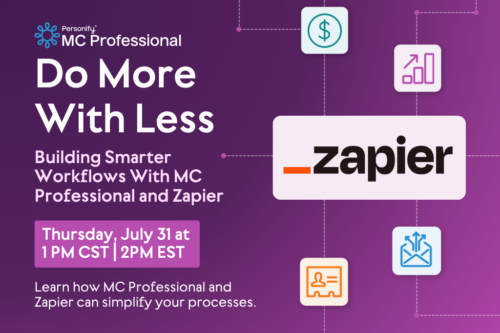As an event planner for an association or membership organization, the end of the event feels like a job well done. However, your work is far from over once the event concludes. To learn from your successes and failures and create even better events in the future, you need to gather and assess attendee feedback with post event survey questions.
The best way to gather this feedback is with a post-event survey. Instead of guessing your attendees’ thoughts and opinions, it’s important to ask them point-blank to share their feedback.
We realize putting together a post-event survey takes time (which you likely don’t have a lot of), so to help out, we’ve put together 20+ questions you need to ask your attendees, as well as several additional questions you may want to ask depending on your event goals. However, keep in mind that in order to see the greatest number of responses, you should keep your post-event survey short and sweet.
First, let’s explore what a post-event survey is and why it’s important. Then, we’ll explore specific examples to get your association or membership organization the types of feedback you need to continue improving and throwing meaningful, inspirational events.
What is a post-event survey?
You just hosted the event of the season—or so you think. How will you know if everybody else was on the same wavelength? That’s where your post-event survey comes in. Think of this as another tool in your toolkit to retain event attendees for the future and to continue throwing the best events.
In short, a post-event survey is a questionnaire sent to event attendees after the experience has concluded to gather feedback. An event could be anything from an intimate gathering of members to your yearly over-the-top gala. In both situations, a post-event survey is crucial to get inside the minds of your attendees.
Why should you send out event feedback surveys?
There’s infinite value in receiving feedback, both good and bad. The good tells you what you should keep doing for next time and the not-so-good helps you improve. Post-event surveys are the perfect time to get honest feedback from your attendees, volunteers, speakers and staff. Any piece of information they can give in order to help improve in the future is a win for your association or organization.
Post-event surveys allow associations to receive direct feedback from members to assess the successes and failures of the event. This allows event organizers to improve future event offerings by incorporating members’ preferences.
What are the general types of post-event survey questions?
Depending on the type of event and the audience you’re trying to reach, there are a variety of types of questions you may want to consider. Each type of question has a time and place for the type of feedback you’re trying to garner.
Interval Scale Questions
Interval scale questions allow your attendees to rate event aspects on a scale of one to ten, or whatever scale makes sense for your organization. These can be rendered in a star format, radio buttons or sometimes a sliding scale.
Open-Ended Questions
Open-ended questions offer your attendees a chance to expand on their ratings and freely share their thoughts and suggestions. Make sure to leave enough space in the form field for your attendees to expand if done virtually!
Yes/No Questions
These questions are reserved for straightforward answers, such as “did you attend a certain aspect of the event” or “did you receive all of the information.” You can use Yes/No questions for definitive answers or as qualifiers for other questions. For example, “did you attend X session”, if they respond ‘Yes’ you can ask more about their experience.
Multiple-Choice Questions
This selection is all about the options! Allow attendees to choose from a list of options that you’ve pre-determined. Multiple-choice questions will get you the most quantifiable data within a standardized format.
What questions should you ask in your event feedback form?
Now you know why the post-event feedback and follow up is important, so let’s talk specifics. As an event planner or organizer, this is what you should be asking your attendees, starting with the absolute musts.
Must-Ask Questions
Some things you just can’t live without, and when it comes to event survey feedback, these are the ones you don’t want to leave out:
1. Overall, how would you rate the event? (Interval scale question from very unsatisfactory to very satisfactory)
This question provides a quick snapshot of overall attendee satisfaction, acting as a crucial benchmark for your event’s success.
2. Please rate the following aspects of the event: (Interval scale question from very unsatisfactory to very satisfactory)
- Date and Time
- Location
- Speakers
- Sessions
- Food and Beverages
- Vendors
These questions help you dissect the event into specific areas, allowing you to identify what elements resonated well and which ones need improvement.
3. What did you like most about the event? (Open-ended question)
This question invites attendees to share their positive experiences, giving you insights into what aspects to replicate in future events.
4. What did you like least about the event? (Open-ended question)
This question helps in identifying any shortcomings, offering a clear direction on what needs enhancement or complete rethinking.
5. How do you think this event could have been improved? (Open-ended question)
An open-ended question that encourages constructive feedback, providing actionable insights for future planning.
6. Was this the first time you attended one of our events? (Yes/no question)
This question helps in understanding the mix of new versus returning attendees, offering insights into your event’s reach and attendee loyalty.
7. Based on your experience at this event, how likely are you to attend future events? (Interval scale question from very likely to not likely)
An interval scale question that assesses the likelihood of repeat attendance, crucial for understanding and improving long-term attendee engagement.
8. How likely are you to recommend our events to a friend/colleague? (Interval scale question from very likely to not likely)
This question measures the potential for word-of-mouth promotion, a key indicator of the event’s overall impact and attendee satisfaction.
9. Do you have any other suggestions or comments to help us improve our future events? (Open-ended question)
A space for open-ended feedback, where attendees can provide more detailed suggestions and comments for future improvements.
Additional Optional Questions (Depending on Your Organization)
Now that you have the basics covered, check out these additional questions you might ask depending on your organization’s unique situation and what you’re hoping to learn from your attendees.
1. Why did you decide to attend this event? (Open-ended question)
Understanding attendees’ motivations provides valuable insights for tailoring future events and marketing strategies.
2. Before the event, what types of marketing materials did you see? (Multiple-choice question)
This helps gauge the effectiveness of different marketing channels like social media, email campaigns, and printed materials.
3. How would you rate the ticket price? (Interval scale question)
Assess whether attendees found the price reasonable and reflective of the event’s value.
4. What did you learn from the event? (Open-ended question)
Insights into the educational impact guide the content and focus of future events.
5. What topics would you like to see more of at future events? (Open-ended question)
Understanding audience interests helps in planning relevant and engaging content.
6. On a scale from 1-10, how easy was navigating the event registration page? (Interval scale question)
Feedback on the registration process can reveal areas for improvement in user experience.
7. On a scale from 1-10, how successful was the event at facilitating networking opportunities? (Interval scale question)
Measuring the event’s effectiveness in providing networking opportunities is crucial for many attendees.
Questions for Staff or Volunteers Who Worked the Event
Your event attendees aren’t the only ones you should be gathering feedback from in order to gauge the success of your event. Check out these questions you might ask staff members or volunteers who worked the event:
1. Do you think this event was a success? (Yes/no or open-ended question)
This question aims to capture a general perception of the event’s success, allowing for a straightforward yes/no response or more detailed feedback.
2. What could we do to improve? (Open-ended question)
Encouraging specific suggestions, this question is key for identifying areas needing enhancement from the attendees’ perspective.
3. What was the most successful part of the event? (Multiple choice question)
By offering specific aspects of the event as options, this question helps pinpoint the elements that resonated most with attendees.
4. What suggestions do you have for improving our events? (Open-ended question)
This invites more detailed and constructive feedback, providing valuable insights for future event planning.
5. On a scale of 1-10, how prepared did you feel to take on your event duties? (Interval scale question)
Particularly relevant for staff and volunteers, this question assesses how well-equipped they felt to perform their roles, highlighting potential areas for better preparation or training.
Questions for Event Sponsors
Your event also wouldn’t have been possible without the backing of your event sponsors. Without the sponsors, you may not have been able to throw the event. That’s why it’s vital to also follow up with questions like the ones below.
1. Would you be interested in sponsoring future events based on your experience with this event? (Yes/no or open-ended question)
This question seeks to understand the sponsors’ overall experience and their interest in future collaborations, allowing for a simple yes/no answer or more detailed feedback.
2. Did you have all the resources and materials you needed to effectively sponsor the event? (Yes/no or open-ended question)
This assesses whether the sponsors felt adequately supported and equipped, providing insights into how the event can better facilitate sponsor involvement.
3. What suggestions do you have for improving our events? (Open-ended question)
Sponsors often have unique perspectives on event success; this question invites their valuable suggestions for enhancements.
How should you send your post-event survey?
There are a variety of ways you could send your post-event survey to your attendees, depending on your overall goals and the type of event. Check out which avenues you might consider below for post-event survey follow up. Remember, you may choose more than one in order to reach the most people!
- Email: This is one of the top ways to distribute an event feedback form. Why? Almost everybody has an email address and if done correctly, it’s an easy way to gather feedback. Only consider using email if you are sure your email lists are clean from the event and you’ll be able to reach every single attendee.
- Social media: This option is great for those who have a strong social media presence, or who have a heavy social component to their event. If your event had a closed Facebook or LinkedIn group for communication, or a live-tweeting hashtag, make sure to post the link to provide feedback in those groups.
- Attendee App: If you’re hosting a virtual event, you’ll want to ensure your virtual event software makes your event seamless. The right software will also offer capabilities to interact with your audience both during the event and at the conclusion.
- Your website: You may have a landing page for the event or an integration with your event software, which would make hosting the post-event feedback on your website the perfect choice.
- In-Person: If your event is an in-person event, it’s important to give your link for post-event follow up while you still have the audience’s attention. While a tangible form will be harder to synthesize and capture later, some events may see a higher response rate if given in-person.
How can you incentivize responses?
Your post-event survey success is dependent on the amount of people who are willing to provide responses. While you hope your attendees will feel empowered to leave their comments to help you improve in the future, sometimes it takes a little more to incentivize your attendees.
- Enter respondents into a drawing for a free gift.
Who doesn’t love the opportunity to receive something for free? Give away event swag, a gift card to somewhere related to the event or a free registration to your next event. - Send the survey ASAP after the event concludes.
While it’s fresh on the brain, you want to make sure to get the survey out the door. Drop the link into your event software right at the conclusion of the event, offer opportunities for feedback directly after specific sessions or grab in-person feedback before your attendees leave. - Make sure you’re reaching out to the right audience.
You’ll have different survey questions for different audiences, so ensure the post-event follow up is tailored to the correct audience. In addition, make sure you’re using the most up-to-date list of attendees. You most likely will have last minute additions and attendees who needed to bow out. - Keep the survey as brief as possible.
Attention spans are short, and your attendees just attended the event of a lifetime! They’re still reeling from the highs of the event. You’re more likely to get more responses if you keep the survey short and sweet.
Final thoughts on post-event survey questions
Remember that short and sweet is the perfect way to gather feedback from your event attendees, volunteers, staff and sponsors. Using a mixture of open-ended, yes/no, interval scale and multiple choice questions will help you form a well-rounded event feedback survey. Start with the musts and develop specific questions depending on the type of event you hosted. You’ll want to use a variety of channels and avenues to ensure you give all attendees an opportunity to provide their valuable feedback.
Importantly, don’t forget to schedule a debrief with your team to actually put the data you gather to good use. Use this ultimate post-event checklist to make sure you don’t miss a beat.
Luckily, you can have help along the way. MemberClicks is the best platform to host virtual events, send your post-event feedback forms and properly store the insights so you can continue to improve, time and time again. Request a demo so we can show you the infinite possibilities for your next event.
















